Introduction 7 Chapter 1. Learning 11 Teachers 12 Experience, Including Failure and Suffering, Can Be the Best Teacher: The School of Hard Knocks 14 Regarding Talented Students 15 Learning Is an Endless Task That Requires Great Effort 17 A Little Learning Is a Dangerous Thing 18 True Knowledge 19 Chapter 2. Patience and Perseverance 20 Chapter 3. Humility and Contentment 24 Cautions Against Pride and Boasting 27 Humility Means Not Judging or Criticizing Others 29 Chapter 4. Talking 30 Cautions About Speaking 31 Gossip and Slander 34 Tactfulness 35 Correct Speech 36 Heed Good Advice 37 Dont Forget to Laugh 38 Cautions About Behavior in General 38 Chapter 5. Morality 42 Do No Harm to Others 43 The Moral Person 44 The Consequences of Wrongdoing 45 Wrongdoing Is Always Discovered and Punished Eventually 46 Avoid Temptation 48 Repentance and Redemption 49 Chapter 6.
Money 50 Chapter 7. Conformity 55 Work for the Benefit of the Group Rather Than Your Own Individual Selfish Desires 57 Strength Lies in Unity 57 Chapter 8. Age 59 Aging and Mortality 60 People Often Do Get Better with Age 62 The Problems of Old Age 63 Chapter 9. Time 65 Chapter 10. Friends True Friends Are a Treasure 70 The Nature of Friendship 71 Chapter 11. Family The Family 77 Parents and Children 78 Husband and Wife 81 Chapter 12.
Women Chapter 13. Fate 89 The Futility of Fighting Fate 91 Challenging Authority as Futile as Fighting Fate 93 Every Cloud May Have a Silver Lining (but Every Clear Sky May Soon Have Clouds!) 93 Not Every Misfortune Can Be Blamed on Fate. Too Often We Bring Misfortune Down on Ourselves. 95 But Perhaps Where Theres a Will, Theres a Way. 95 Chapter 14. Animal Metaphors Animals That Represent Powerful or Superior People 99 Tigers 99 Dragons 104 Phoenixes 105 Animals That Represent Ordinary People 106 Horses 106 Oxen 110 Pigs 111 Animals That Represent Base and Lowly People 112 Dogs 112 Animals That Represent Meek People 115 Rabbits/Hares 115 Chickens 116 Animals That Represent Evil People 117 Snakes 117 Mice and Rats 119 Foxes and Weasels 120 Cats 121 Other Animals 123 Wild Geese 123 Other Birds 123 Fish 125 Miscellaneous Animals 127 Chapter 15.
Food Proverbs 130 Expressions Related to Food 135 Chapter 16. Miscellaneous Favorite Sayings An Individuals Position in Society 146 Good Advice 149 Chapter 17. Proverbs That May Sound Familiar to English Speakers Chinese Sayings Borrowed from the West 154 Common Humanity, Common Wisdom 154 Chapter 18. Sayings Attributed to the ChineseRightly or Wrongly Index
Introduction
The proverbs of any country or culture contain the wisdom accumulated by its people over countless generations. China is the worlds oldest continuous civilization, with over three thousand years of history. It is, therefore, hardly surprising that the Chinese language is a particularly rich source of wisdom.
Arguably no other language or culture has such a treasure trove of proverbs and popular sayings that comment on every aspect of the human experience. It has as many as 20,000 literary idioms and tens of thousands of popular maxims and sayings, in addition to the pithy and profound quotes to be gleaned from three millennia of Chinese philosophy and literature. Whenever people in the English-speaking world hear of an especially insightful or clever quote whose origin seems at first uncertain, we look first to the Bible and then to Shakespeare (and Mark Twain, if youre American). However, if the quote turns out to be from none of those major sources of wit and wisdom, we then assume it must be a Chinese sayingand very often that, indeed, proves to be the case. Every language and culture has many wonderful proverbs, of course, but no other matches Chinese in the sheer number of books and web sites devoted to it. In Western countries like the United States, proverbs are heard less and less.
Because individuality and creativity are prized, quoting age-old sayings is considered trite and outdated. Few young people in America today are heard to utter such maxims as a stitch in time saves nine, an ounce of prevention is worth a pound of cure, or the early bird catches the worm. In China, however, sayings like the ones collected here are still peppered throughout daily speech. Their ancient culture gives the Chinese shared terms of reference in the thousands of phrases that sum up a situation in a few widely understood words. Employing the literary idioms demonstrates an educated background, and the use of the wide variety of sayings adds color and spice to conversationto the point that the speech of someone who does not sprinkle his speech with these proverbs and maxims is said to have no flavor. In such a group-centered society, the emphasis is not on originality but, rather, on enjoying a shared cultural background.
Wit and originality are displayed by cleverly changing the proverbs wording to say things in a fresh and humorous way. The Chinese distinguish between literary idioms, which usually consist of four words and derive from ancient stories; five- and seven-word maxims, which are considered reasonably refined and often come in rhyming couplets; and popular sayings passed down by the common people over many generations, which typically have no set length or form. Because this book is intended for people in the West who might be unconcerned with these traditional categories but are only interested in pearls of wisdom from any source, we have mixed together all the various types of proverbs and sayings. We have also included a few of the most famous quotations from Chinese writers, poets, and philosophers in the past three thousand years. Of course, no book of pithy wisdom could do without a few choice phrases said to have been uttered by Confucius, the most revered of all Chinese sages. The emphasis in this book, however, is on the popular sayings of the common peoplewhich best represent the Chinese people as a whole.
In general, we have included only the most important and most beloved sayings known to most Chinese. Some books or web sites on Chinese sayings give too few, while others catalog far too many. We have tried here to strike a useful compromise between those two extremes, to reach what Confucius called the Golden Mean. This book is intended neither for scholars nor solely for those who already know Chinese. For those who are familiar with the language, we have included the original Chinese sayings in Chinese characters as well as in pinyin romanization. Our main goal, however, is to share with English speakers the rich variety of great insights and colorful metaphors that Chinese proverbs offer.
This book is for all those who love pithy sayings about life, who love wordplay and clever turns of a phrase, and who want to gain a better understanding of Chinese culture. What makes our book unique in the sea of other works available on this subject is that we attempt to show how Chinese proverbs and sayings reflect the Chinese view of the world. The book is divided into eighteen chapters, which group the sayings according to the various aspects of the human experience on which they comment, ranging from family and friends to money and morality to food. Each chapter begins with an explanation of the Chinese cultural background that relates to each of those topics. Our fondest wish is that the reader will enjoy learning these nuggets of wisdom and witticisms and will be inspired to look deeper into Chinese history and culture. (All human beings in the world are one family.) S hi zh ni ji xingd y.

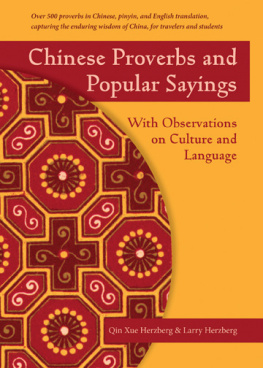
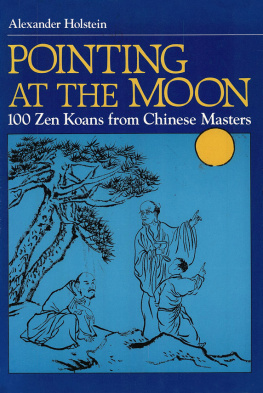



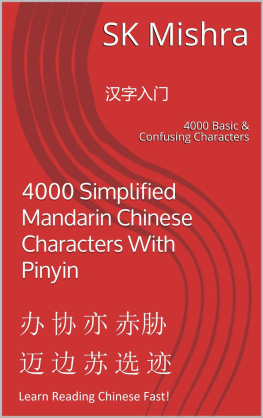


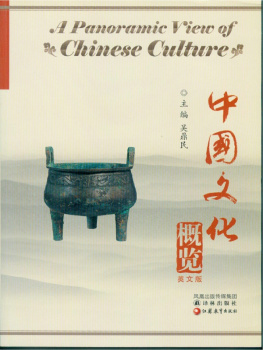
![Yi Ren - Mandarin Chinese for Beginners: Learning Conversational Chinese / Mastering Conversational Chinese [Book]](/uploads/posts/book/146887/thumbs/yi-ren-mandarin-chinese-for-beginners-learning.jpg)



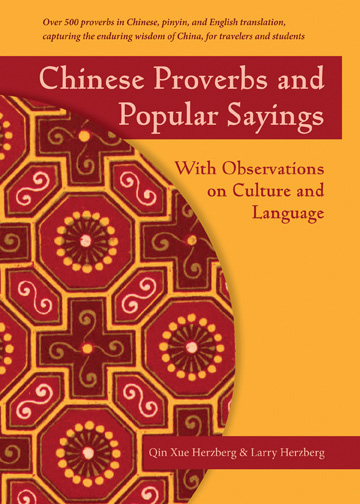 Chinese Proverbs
Chinese Proverbs